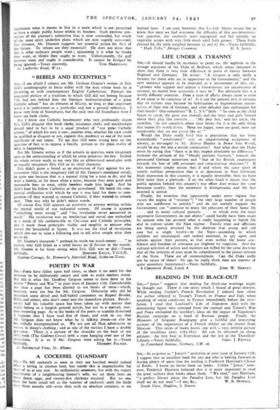POETRY IN WAR
Sni,—Poets have fallen upon bad times, so there is no need for the reviewer to be deliberately- unjust and seek to make matters worse. But this is what Mr. Geoffrey Grigson seems to have done in his review "Poetry and War" in your issue of January 57th. Considerably less than a page has been allotted to ten books of verse—which, however, were too few for Mr. Grigson. Otherwise why did he introduce some drivel and half-baked comments on Rupert Brooke, Rilke, and others, who don't come into the immediate picture. Result: nearly half his valuable space has been taken up with matter that might belong to a longish general article, but not to a starved, war- time reviewing page. As to the books of the poets so scantily dismissed it happens that I have read five of them, and wish to say that Mr. Grigson does not know what he is talking about—or else he has wilfully misrepresented us. We are not all Hun adversaries or wolves in sheep's clothing ; and as ode of the victims I have a double grievance. There is a picture of the swastika on the back of my little book (The Gallows-Cross) with a rope hanging over one of the Projections. It is as if Mr. Grigson were asking for it.—Yours






























 Previous page
Previous page